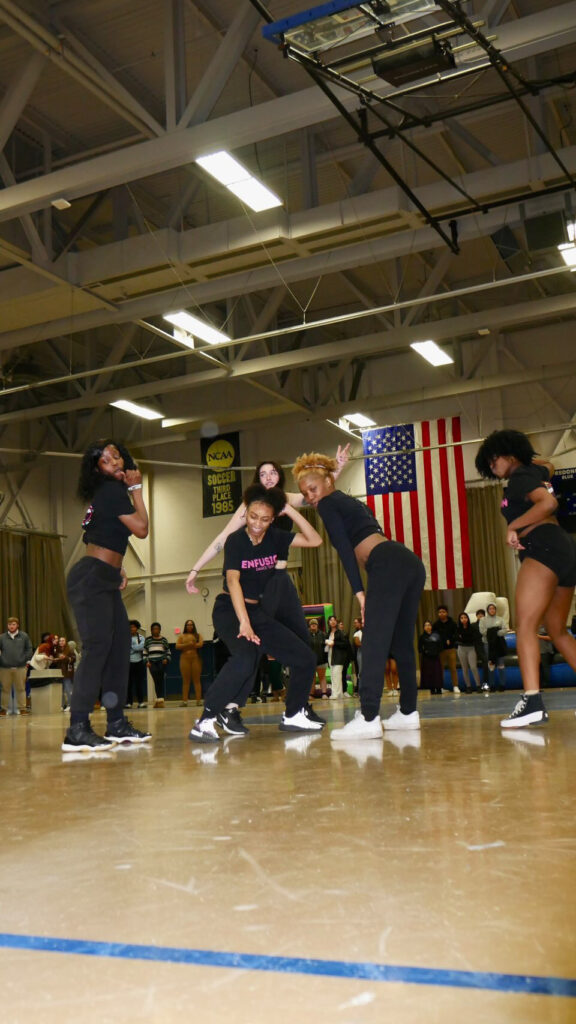NERON SIMPSON
Special to The Leader

Photograph By AMBER LOUIS | Special to the Leader.
At predominantly white institutions (PWI), students of color may sometimes feel as if they have little cultural connection to the school itself. For students of Hispanic and Latin backgrounds, one way of coming together and celebrating their cultural similarities at Fredonia is through Carnaval.
Carnaval is an annual event hosted by Latinos Unidos that occurs on the Friday after Spring Break leading up to Multicultural Weekend. This is a weekend in which prospective Fredonia students visit campus during the spring semester and attend events hosted by Intercultural Center organizations, such as Brother2Brother’s Family Feud Night and Black Student Union’s (BSU) Annual Fashion Show.
These events are intended to provide a glimpse into the diversity of the campus community, and serve as possible organizations that the students themselves may be interested in joining if they attend Fredonia.
Greeted by a medley of Afrobeats and Reggaeton music, Steele Hall was alive with students from all majors. With college being a hectic and busy experience in one’s life, it can be refreshing to be around and speak to people who study different disciplines.
A line formed for food, which was catered by local Dunkirk restaurants Alma Latina and Taqueria Mexicana. Tables were filled with an array of delicious Latin options.
One could encounter savory pernil (slow-roasted marinated pork), rice and beans, stewed chicken, maduros (fried sweet plantations), and crispy pastelitos (in chicken and cheese). There was also a nacho and ice-cream station for those who craved other sweet and salty options.
In addition to the food, there were Carnaval games including basketball toss, wand buzzer, giant Jenga and giant Connect 4.
A new addition to this year’s event was a life-sized, inflatable foosball table where students played as the figurines.
At each station, volunteers handed out varying numbers of tickets for participating and winning games.
Standard red tickets could be traded in at the prize table for blue raffle tickets. Similar to the food, the prize table had a variety of options. Prizes were a balance of practical to recreational items, giving students the opportunity to win flat screen televisions, a rice cooker, themed baskets, a JBL speaker and a Nintendo Switch.
Leading up to raffle winner announcements, there were performances by student dance group EnFusion and gospel choir group Divine Sound.
In the midst of having fun, it is important to acknowledge the historical significance of Carnaval in Latin American and Caribbean communities. The Trans-Atlantic slave trade displaced millions of African people throughout the Caribbean, North America and South America.
Being forced to inhabit unfamiliar environments, enslaved Africans combined elements from their respective cultures along with Indigenous cultures and European influence to create their own customs. Carnaval served as a rebellion against colonialism and slavery, and was practiced as an act of freedom and celebration.
Carnaval also served to strengthen community ties and to uplift younger generations. Through celebrations of music and dancing, customs and values were passed down to children to affirm confidence, appreciation and empathy.
Latinos Unidos’ commitment to hosting an annual Carnaval serves as an opportunity to connect students of diverse backgrounds.
Q + A with Iaisha Babb, EnFusion president:
Neron Simpson (NS): Carnaval has been used as a tool for liberation in the Latin and Caribbean diaspora. What does liberation mean to you and how does it show up for you in EnFusion, being the group president?
Iaisha Babb: “Liberation, to me, is about the freedom and allowance to do and be whomever you want to be. For EnFusion, it shows up in the dance styles that we do. As someone who studies dance and is earning a degree in this field, cultural dances are always seen as these proper, traditional forms. Many times they show up as something that is “barbaric,” “too fresh” or “unnecessary.” With EnFusion, we get to do that on campus freely, and really show a part of ourselves in our culture on a campus that is not always so inclusive, because it is a PWI. The fact that EnFusion is able to bring that sauce, spice and flavor to Fredonia’s campus is liberation within itself.”
Q + A with Elsie Tecalero (ET), President of Latinos Unidos:
NS: Carnaval was often used as a way for Latin and Caribbean people to feel liberated. What does liberation look like to you and how does it show up for you in your life?
ET: “To me, liberation looks like expressing your culture and beliefs freely without being scared of repercussions. The way it shows up for me is being a part of Latinos Unidos(LU). Being at a PWI as a person of color can feel intimidating, for me at least. LU allows me and others to express themselves and also educate others about our culture through general body meetings and big events such as Carnaval and Latin Night!”
NS: What is some advice you would give to a student who may have a hard time fitting in?
ET: “I would say put yourself out there and do not be afraid. When I first came here the first thing I was looking for was something Latino/Hispanic related, so when I saw Latinos Unidos on the list of clubs I was so relieved. Activities Night is the place to be if you want to make new friends and for your personal growth. But if you think there isn’t something that you feel expresses your culture/ethnicity or if there is something you want to put out there, make it! You can always create a club and who knows, maybe you’ll create something that will make others feel inclusive as well!”
For more information about EnFusion and Latinos Unidos events, both organizations can be found on Instagram @enfusiondance and @latinosunidosfsu. You can also email the club presidents at ibabb@fredonia.edu and etecalero@fredonia.edu to be added to their email lists.
